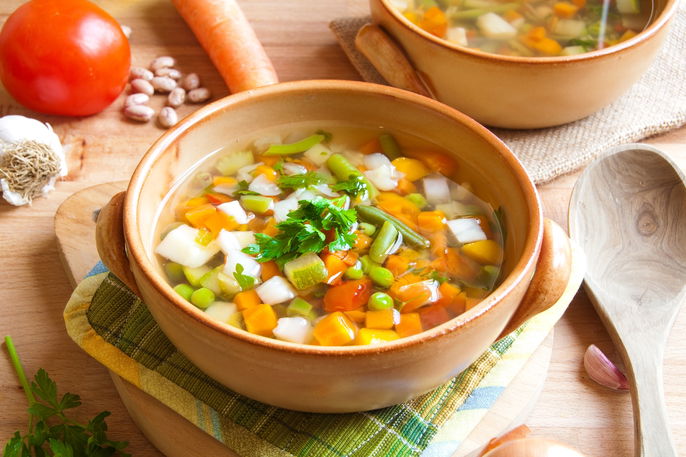When you have a stomach ache, you are advised to opt for foods that are easy to digest, such as boiled vegetables, cooked fruit and soup. In addition, some home remedies, such as raw potato juice, chamomile tea and boldo tea, have soothing action that can help to relieve stomach pain.
Foods such as raw vegetables, high-fat dairy products, alcoholic beverages, fried foods in general and processed foods should be avoided, as these irritate the stomach and are more difficult to digest.
Stomach pain can be caused by conditions such as gastritis, reflux, anxiety and stomach cancer. Therefore, if the pain persists for several days and does not resolve with diet changes, it is recommended that you visit a gastroenterologist to assess the possible causes and treat the pain individually. Get to know ARTICLE MAPPED TO EN: all the causes of stomach pain.

Recommended foods
The foods recommended for upset stomach should be easy to digest and low in fat. They should also be low in fiber, as fiber takes a long time to digest in the stomach and can worsen pain. The food you should eat when experiencing upset stomach are:
- Fruits such as papaya, apples, pears, melons, bananas and guavas, preferably unpeeled and cooked or mashed
- Vegetables such as zucchini, eggplant, carrots, spinach and pumpkin, well cooked or pureed
- Low-fat proteins such as chicken, turkey, tofu and fish, preferably grilled, baked or stewed
- Low-fat dairy products, such as skimmed yogurt, skimmed milk and white cheeses
- Vegetable drinks, such as oat milk, rice milk and soy milk
- Low-fiber grains, such as white rice, white pasta and white bread
- Tubers such as potatoes, cassava, sweet potatoes and yams, unpeeled and boiled or mashed
- Caffeine-free drinks such as water and coconut water
- Extra virgin olive oil, in small quantities
- Natural spices such as basil, garlic, onion, parsley, coriander and marjoram
In addition to food, chamomile, sea buckthorn and licorice tea and raw potato juice are also great home remedies for relieving stomach pain.
Acidic fruits such as oranges, lemons, passion fruit and acerola can worsen stomach pain in some people. In such cases, these foods should be avoided.
What to eat after a stomach ache
After a stomach ache, it is important to gradually return to a healthy and varied diet to avoid any deficiencies of important nutrients, such as fiber, vitamins and minerals. To do this, it is recommended to include foods such as:
- All fruit, such as grapes, apples, oranges, strawberries, tangerines, bananas and mangoes, natural and with the peel on (where appropriate);
- Raw and cooked vegetables, such as lettuce, tomatoes, broccoli, cauliflower and garlic;
- Whole grains, such as brown rice and wholemeal pasta;
- Legumes, such as beans, chickpeas and lentils;
- Whole milk and dairy products, such as milk, yogurt and cheese;
- Healthy fats, such as nuts, pumpkin seeds and linseed oil;
- Proteins, such as beef, chicken, fish and eggs.
In addition, caffeinated drinks and foods such as coffee, dark chocolate and green tea can also be resumed, but should be consimed in moderation to prevent stomach ache from reappearing.
Meal plan for upset stomach
The following table outlines a suggested 3-day meal plan for upset stomach:
The foods on this meal plan can vary according to each person's tolerance and health status. Therefore, you are it advised to consult a registered dietitian, who will conduct a thorough assessment to determine a diet that meets your individual needs.
Although an upset stomach can reduce appetite, it's important to eat small meals, every 3 hours. Going too long without eating can lead to increased acid production in the stomach, making the pain worse.
Foods to avoid
Foods that should not be eaten are generally those that longer to digest and can irritate the stomach. Examples of foods to avoid include:
- Processed meats, such as sausage, bacon, ham, salami and bologna;
- High-fat dairy, such as whole milk, whole yogurt, cheddar cheese, mozzarella and prato cheese;
- Ready-made sauces such as ketchup, soy sauce, mustard and mayonnaise;
- Fatty foods, such as fried foods, packet snacks, frozen lasagna, pizza snacks, hamburgers and hot dogs;
- Coffee or teas with caffeine, such as green tea, mate or black tea;
- Condiments such as pepper, curry, chili and paprika;
- Processed drinks, such as soft drinks, teas and juices in cartons or bottles;
- Alcoholic drinks such as beer, wine and sparkling wine;
- Sweets in general, such as ice cream, cake, pudding, jam and filled cookies.
In addition, acidic fruits such as lemon, orange, acerola and pineapple can also cause stomach irritation in some people.
Foods such as cauliflower, broccoli, beans, chickpeas and lentils should also be avoided or reduced as they can increase gas production, leading to more discomfort.






























